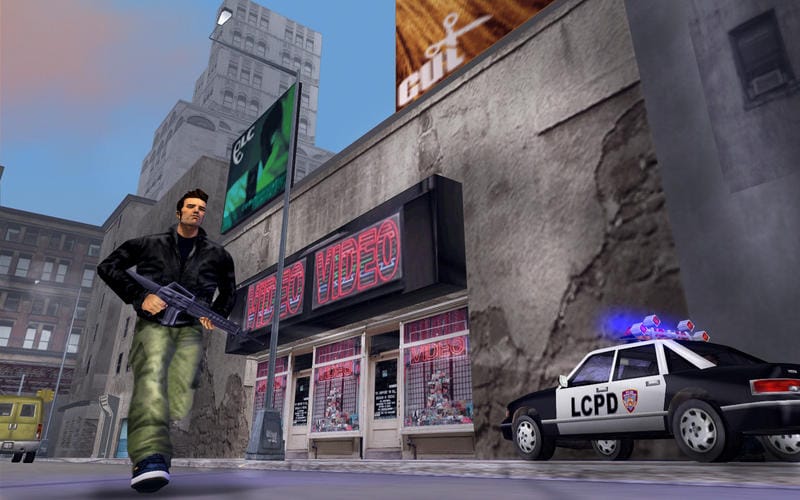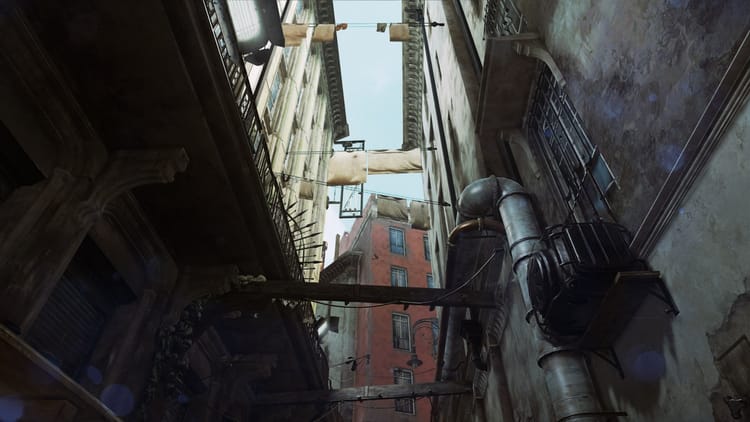The inglorious nihilism of Grand Theft Auto V

Grand Theft Auto V (2013) is a confidence trick; Rockstar is a fraud. They tell people to distrust capitalism and suspect politics—the entire world, and all its peoples, are venal. In the same breath, they promise sanctuary. “Are you young? Are you angry? Are you an iconoclast, too? Then Rockstar and Grand Theft Auto are here for you,” they seem to say. But it’s a con. Rockstar embraces cynics and outsiders, but only so it may reach a hand into their pockets.
Generally, Grand Theft Auto is nihilistic, in a manner betokening not worldliness but arrogance. The chief villain of Grand Theft Auto V is Devin Weston, a billionaire whose wealth and power are used as weapons against the protagonists. “I’m rich enough to do whatever the fuck I like,” says Weston “and you’re poor enough not to ask me any goddamn stupid questions.” Corporations are evil in Grand Theft Auto V: LifeInvader, a social networking site and parody of Facebook, even the name of which marks Rockstar’s opinion on technology firms, carries the slogan “it’s not just technology. It’s your life,” and instead of a “Like” button encourages users to “Stalk” one another. And Michael De Santa, one of the three playable characters, is leading a life surreptitiously destroyed by money—his kids are spoiled, his wife is shallow and he is unfulfilled. In Grand Theft Auto V, wealth and success are uniformly corruptive. Yet, just days after the game’s launch, Rockstar’s owner Take-Two Interactive issued a press release, boasting that Grand Theft Auto V had already made $1 billion. In 2012, Grand Theft Auto co-creator and Grand Theft Auto V lead designer Dan Houser purchased a flat in New York City for $12.5 million. And of course, Rockstar has its own Facebook page, through which Grand Theft Auto V is advertised and sold.
In Grand Theft Auto V, wealth and success are uniformly corruptive
Aside from my personal dismay that a game as miserable as Grand Theft Auto V can earn so much money, and that its creators can earn such luxury off the back of it, none of these stories are particularly assailable. But patently, Grand Theft Auto V is immensely insincere and hypocritical. I don’t for a moment believe that either Rockstar or Take-Two, both of which earn substantial profit, the latter of which enjoys great success on the NASDAQ, are seriously critical of corporate structure, nor do I concede that Dan Houser, a multimillionaire, is in a position to pen even-handed criticism of the rich and famous. The success of Grand Theft Auto and its creators is legitimate. Its political conscience and artistic aspiration are not—under the rubrics of rightful protest and uncensorable indignation, it plies its audience with counterfeit “truth.”
And even if the makers of GTA V truly believe in what their game says, they are spiteful, vapid writers. Grand Theft Auto was once being made by a plucky, young studio from Scotland called DMA Design. Back then, the games’ nihilistic shouting—its punching up, down, and across—felt justified. Punk was dead. So was Gen X. And with the launch of the first PlayStation, videogames were becoming more corporate than ever. A tiny British developer, slinging controversy for cash, wasn’t just cool, it was right on. By October 2001, almost a year into the Bush presidency, five years into Tony Blair’s Centrist government and amid a groundswell of Neo-Conservatism, following 9/11, Grand Theft Auto‘s disaffected charm was at its most powerful—when GTA III (2001) said “fuck the world,” it felt like an important message.

Grand Theft Auto‘s success shouldn’t be begrudged. A successful product earns its creator a lot of money, and in turn the creator becomes a bigger, richer company. That’s a dynamic as old as money itself, of which Grand Theft Auto is merely an affirmative example. What I deplore is Grand Theft Auto‘s lack of internal inquiry, its political and social positions which, despite the passage of almost 20 years, and the total redefining of its status within gaming culture and culture-at-large, have remained unchanged. When Grand Theft Auto was an underdog, its disregard for taste—its chew-and-spit treatment of the rich, the poor; women, gay people and people of color—felt like genuine anger, like rebelliousness, without cause. Amid other 90s iconoclasm (the early series of South Park, films by Kevin Smith and David Fincher, games like Postal, Conker, Crazy Taxi) Grand Theft Auto once fit. Even the most easily offended would have conceded it was timely.
But today, with Grand Theft Auto V, we have multi-millionaires, who from the comfort of their offices on Broadway in New York City, make jokes about poor, black Angelenos. Women are still the butt of Rockstar’s wisecracks, as are gay people, people of color, and the poor. Celebrities, white guys, and the rich and famous get thrown under the bus as well, and some might be tempted to use that in Rockstar’s defence—the studio goes after everyone, that’s just its style. But where those rich, white people, most probably men, benefit from Grand Theft Auto‘s success, inasmuch as its profits are returned to an industry dominated by people like them, other targets of the game’s so-called satire simply receive yet more discrimination. Grand Theft Auto and Rockstar have both become that which they mock—their self effacement, however, is sold at a premium.
Grand Theft Auto and Rockstar have both become that which they mock
Not that Grand Theft Auto V can truly be called self effacing. When it mocks peoples, American culture and other videogames, Grand Theft Auto V is not cautioning against the system. It is telling its players to trust in something: Grand Theft Auto itself. Like the preacher who castigates other faiths in defence of his own, Grand Theft Auto perpetuates its own sovereignty. The game is not nihilistic. It is theocratic. Any beliefs that one might hold, in politics, in media, in concomitant social responsibility, are denounced. In cynicism and misanthropy Grand Theft Auto players are encouraged to trust. And like a Virginian evangelist, hawking his lies over daytime television, Rockstar grows fat off its toxic gospel.
This, from what is supposed to be gaming’s greatest success. This, from what is often called the medium’s most biting satire. This, from a game that for many millions is the flag bearer for an entire culture. If gaming is to be the prominent art form, or even entertainment form of the 21st century, it surely has to become better than Grand Theft Auto V. Psychologists don’t listen, wives cheat on you, politicians are corrupt—these sentiments, and more, are absolutely adolescent, and yet Grand Theft Auto is talked about as if it’s on the cutting edge. Grand Theft Auto V is not just a bit of fun. It is not a game that shouldn’t be taken seriously. Regardless of how well designed or deliberately absurd its core mechanics may be, they are impossible to enjoy when surrounded by such odious and rankly hypocritical literature. When hundreds of millions of dollars, innumerable hours of labour, and barrels of ink are spent on a game so utterly bankrupt, it is not to be accepted blithely—it is the example of this fledgling art form, once again, misusing its capital at its own peril.



